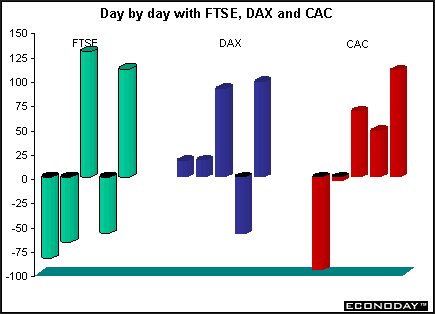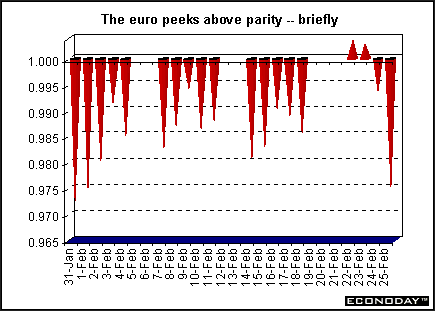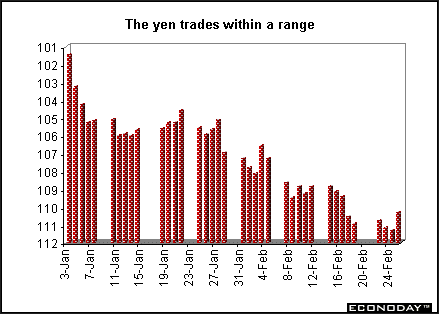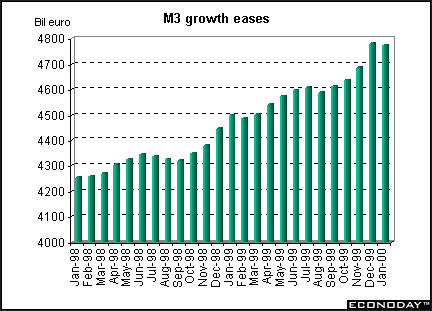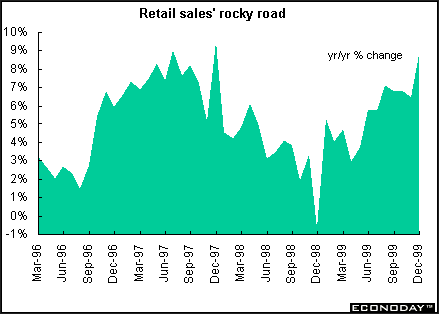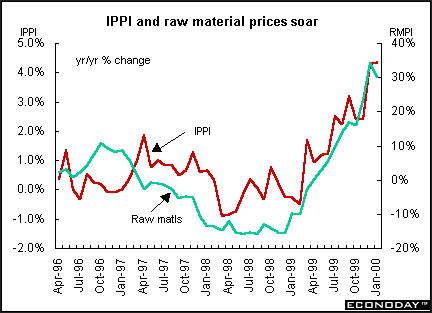| Previous Articles |
|
The
pull between the old and new economies
European markets were directionless at first, but then shook off the Dow's negative influence and posted healthy gains especially on Friday. The Frankfurt DAX set yet another new high despite market turbulence and the sinking euro. It ended the week at 7739, up 165 points or 2.2 percent. The Paris CAC regained some of its sparkle and climbed 2.1 percent or 126 points on the week to end at 6189.
The London FTSE 100 was in danger of sinking below the 6000 mark early in the week when it abandoned its own rally and followed the Dow down. But it managed to pull itself together on Wednesday and again on Friday to overcome the rest of the week's losses. It closed up 33 points or 0.5 percent at 6198 on the week. The FTSE 100 is currently undergoing its quarterly reformulation and as many as 10 old line companies will probably be replaced by technology companies who are benefiting from the Internet boom. Analysts say that the FTSE has under performed since the beginning of the year because of interest rate worries and because of technical factors involving a major merger. Europe's major stock measures have performed better than those in the United States and Japan since the start of the year. For example, Germany's DAX index has risen 11 percent so far this year, while the Dow has shed about 14 percent and the S&P 500 has lost 9 percent. In Asia, the Nikkei 225 Stock index is up over 4.5 percent. Asian markets were also skittish. On the Hong Kong Hang Seng, Internet and telecommunications fever struck with a vengeance and the index vaulted 3.6 percent or 602 points to end the week at 17,201.
On Thursday, the Hong Kong rallied sharply when local telecommunications shares surged in response to the Nasdaq's latest record, lifting the Hang Seng index 681.87 points or 4.16 percent and marking the biggest gain since July 2, 1999. With Hong Kong's currency pegged to the U.S. dollar, any move on the Nasdaq has a big effect. The Nikkei managed to break even on the week, as large positive swings continued to offset losses. The Nikkei closed up 29 points or 0.15 percent to end the week at 19,818. A number of important indicators will be released on Tuesday that should give the markets a better idea of how the Japanese economy is performing.
Currencies
The euro's latest descent was sparked by comments Thursday from European central bankers that decreased the likelihood the ECB will raise interest rates at its March 2 monetary policy meeting. Some traders said that continuing mixed messages on monetary policy might be the biggest hurdle that the euro has to overcome. The currency has fallen even as Europe's benchmark stock indexes have surged, and the gap between U.S. and German government bond yields has shrunk in the euro's favor. The yen rose in value against the U.S. dollar last week to 110.35 yen from 110.95 last Friday. The yen also rose against all 17 other primary currencies in the past week. Some traders said the dollar might be poised to fall below the 110 yen level again, particularly in light of the Dow's slide. The dollar fell from a six month high, as Japanese exporters took advantage of its 8 percent gain vs. the yen this year to bring overseas earnings home.
Although the yen rebounded on Friday, it has been steadily weakening against the dollar and euro. Market participants are worried that Japan's economy, which should surprising first-half 1999 strength, may be losing steam, dimming its investment allure. That would mean Japanese interest rates would remain far lower than in Europe and the United States, drawing investors to those markets. The yen was hurt in recent weeks because Japanese officials said the economy probably shrank for the second straight quarter in the fourth quarter of 1999. Indicator Scoreboard
The drop in money supply is good news for the central bank, which has been concerned with the "generous" liquidity in the euro area. Because the drop was influenced largely by the base effect (the large January 1999 increase in money supply dropped from the calculation), it is difficult to gauge to what extent the deceleration is real. December workday adjusted industrial production rose a stronger than expected 4.4 percent on the year. November output was revised up slightly to show a 3.1 percent annual increase compared to the 2.8 percent rise initially reported. Apart from Belgium, all EMU countries reporting data posted annual output increases in December.
France - Fourth quarter seasonally and workday adjusted real gross domestic product rose 0.9 percent, slightly below most analysts' forecasts, after an unrevised 1.0 percent gain in the third quarter. Strong domestic demand and a large inventory buildup were the primary drivers. However, net exports fell sharply. For 1999, French real GDP rose 2.7 percent when compared with 1998. January consumer price index was flat after a 0.5 percent jump in December. However, it accelerated 1.6 percent when compared with last year. Declines in manufacturing and services prices were just enough to offset rises in energy and food prices. The seasonally adjusted CPI rose by 0.3 percent on the month and 1.6 percent when compared with last year. December seasonally and workday adjusted manufacturing output rose 0.4 percent and 6.2 percent on the year. Fourth quarter manufacturing production pace climbed 2.3 percent after a 1.5 percent increase in the third quarter. The largest monthly gains came from capital goods (1.5 percent), followed by consumer goods (0.8 percent) and auto industry (0.3 percent). Germany - January producer prices rose 0.4 percent on the month and 2.0 percent on the year. The rise in the annual rate is due largely to a base effect caused by low oil prices in January 1999. Energy taxes, which rose on January first, pushed prices up. Excluding oil products, producer prices were up 0.2 percent in January and were only 0.6 percent above the year earlier level. January seasonally adjusted import pricesrose 0.5 percent and were 9.1 percent higher when compared with last year. Non-seasonally adjusted import prices rose 0.8 percent on the month and 9.2 percent on the year. Seasonally adjusted export prices rose 0.2 percent in January and 2.3 percent on the year, after rising 0.4 percent on the month and 1.7 percent on the year in December. Italy - December unadjusted retail sales increased 2.9 percent when compared with last year. For 1999 as a whole, retail sales rose 2.4 percent, the lowest rate since the series was introduced in 1996 (retail sales rose 4.4 percent in 1996, 2.5 percent in 1997 and 2.7 percent in 1998). February consumer confidence dropped sharply after January's surge. The February index stood at 117.9 compared with 121.7 in January. The survey, which was conducted over the first 15 days of the month and is not seasonally adjusted, showed sentiment declined regarding all the main forward looking components of the survey. Optimism on the prospects of the economy as a whole dropped more sharply than that for consumers' personal financial situation. Spain - Fourth quarter gross domestic product rose a seasonally and trend adjusted 0.9 percent on the quarter and 3.9 percent on the year. Excluding the trend adjustment (which smoothes quarterly changes) fourth quarter GDP rose 1.0 percent on the quarter and 4.0 percent on the year. Net exports were the largest contributor to fourth quarter GDP. Trend adjusted exports rose 3.7 percent while imports rose 2.6 percent. Britain - January's trade deficit with countries outside the European Union widened and was the largest since records began in 1988. The non-EU deficit widened to Stg2.382 billion in January from Stg2.261 billion in December. The value of exports rose 3.9 percent while imports rose by 4.3 percent on the month. Growth in exports was mainly due to intermediate and capital goods while imports were pushed up largely by higher imports of crude oil and aircraft. The whole world deficit in December was also the largest since records began. Asia Hong Kong - January's external trade deficit narrowed to US$411.2 million as exports rose 14.1 percent and imports surged by 16.4 percent on year. The continued surge in regional demand, as well as the sustained strong import absorption in the conventional overseas markets, sparked the improvement. Unemployment fell to 5.7 percent in the three months that ended January 31st from 6.0 percent in the three months ending December 31st. The continued economic recovery along with a surge in seasonal employment before the Chinese New Year contributed to the drop. Japan - January retail sales fell 2.2 percent from a year earlier. That compared with an annual drop of 1.3 percent in December. Total commerce transactions were down by 2.4 percent from a year earlier, while wholesale sales fell by 2.5 percent. Large scale retail sales fell by 1.6 percent from a year earlier. After adjustments, large scale retail sales were off by 4.3 percent. January trade surplus shrank more than 30 percent in January but the yen's recent drop is expected to help slow its shrinkage by spurring exports in the coming months. It was the smallest surplus in two years and the 10th consecutive monthly decline from the year earlier figure. High oil prices drove up Japan's import bill and were the major contributor to the shrinking surplus. Japan is the world's second largest oil importer and rising crude oil prices accounted for about 70 percent of Japan's import growth. The trade surplus with the United States shrank 1.9 percent in January from a year earlier for its second consecutive monthly decline. The February consumer price index fell 0.2 percent in Tokyo and was down 0.8 percent on the year while prices in all of Japan fell 0.3 percent in January on the month and fell 0.9 percent on the year. Americas
January non-seasonally adjusted consumer prices declined 0.1 percent despite higher energy prices. The annual rate of inflation dropped to 2.3 percent from 2.6 percent in December. Core inflation, excluding volatile food and energy prices, fell to an annual rate of 1.4 percent from 1.6 percent in December. The monthly core number fell 0.3 percent. On a seasonally adjusted basis, prices fell 0.2 percent. Energy prices rose 0.2 percent on the month, 15.0 percent on the year. January industrial production product prices remained unchanged as the effects of higher prices for refined petroleum products, primary metal products and primary meat products were balanced by declining motor vehicle prices. However, industrial product prices rose at their fastest annual pace in over four years, boosted by strong petroleum, primary metal, primary meat, chemical and chemical product prices. A stronger Canadian dollar and declining motor vehicle prices dampened these increases. Prices for the Industrial Product Price Index (IPPI) climbed 4.4 percent when compared with January 1999, the largest increase since December 1995. But if petroleum and coal products were excluded, the IPPI would have advanced 1.6 percent.
January raw material prices rose 0.5 percent with almost all of that gain due to mineral fuel prices. Surging oil prices again have been responsible for a substantial increase in raw material prices. In January, manufacturers paid 30.0 percent more for raw materials than they did a year earlier. Mineral fuel prices, which more than doubled (109.1 percent) between January 1999 and January 2000, have been the major factor recently in raw material price increases. If the mineral fuels category, almost all of which is crude oil, were excluded in January, the year-over-year increase in raw material prices would have been just 5.0 percent while the index on a monthly basis would have been unchanged. BOTTOM
LINE
Release
dates are subject to change. |
||||||||||||||||||||||||||||||||||||||||||||||||||||||||||||||||||||||||||||||||||||||||||||||||||||||||||||||||||||||||||||||||||||||||||||||||||||||||||||||||||||||||||||||||||||||||||||||||||||||||||||||||||||||||||
